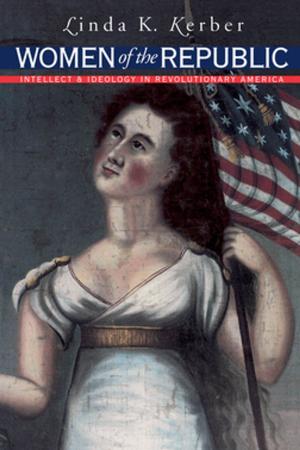The Negro in the American Revolution
Nonfiction, History, Americas, United States, Revolutionary Period (1775-1800), Social & Cultural Studies, Social Science, Cultural Studies, African-American Studies| Author: | Benjamin Quarles | ISBN: | 9780807838334 |
| Publisher: | Omohundro Institute and University of North Carolina Press | Publication: | December 1, 2012 |
| Imprint: | Omohundro Institute and University of North Carolina Press | Language: | English |
| Author: | Benjamin Quarles |
| ISBN: | 9780807838334 |
| Publisher: | Omohundro Institute and University of North Carolina Press |
| Publication: | December 1, 2012 |
| Imprint: | Omohundro Institute and University of North Carolina Press |
| Language: | English |
Originally published in 1961, this classic work remains the most comprehensive history of the many and important roles played by African Americans during the American Revolution. With this book, Benjamin Quarles added a new dimension to the military history of the Revolution and addressed for the first time the diplomatic repercussions created by the British evacuation of African Americans at the close of the war. The compelling narrative brings the Revolution to life by portraying those tumultuous years as experienced by Americans at all levels of society.
In an introduction, Gary B. Nash traces the evolution of scholarship on African Americans in the American Revolution from its early roots with William C. Nell to this groundbreaking study. Quarles's work not only reshaped our thinking about the black revolutionary experience but also invigorated the study of black history as we know it today.
Thad W. Tate, in a foreword, pays tribute to the importance of this work and explains its continuing relevance.
Originally published in 1961, this classic work remains the most comprehensive history of the many and important roles played by African Americans during the American Revolution. With this book, Benjamin Quarles added a new dimension to the military history of the Revolution and addressed for the first time the diplomatic repercussions created by the British evacuation of African Americans at the close of the war. The compelling narrative brings the Revolution to life by portraying those tumultuous years as experienced by Americans at all levels of society.
In an introduction, Gary B. Nash traces the evolution of scholarship on African Americans in the American Revolution from its early roots with William C. Nell to this groundbreaking study. Quarles's work not only reshaped our thinking about the black revolutionary experience but also invigorated the study of black history as we know it today.
Thad W. Tate, in a foreword, pays tribute to the importance of this work and explains its continuing relevance.















